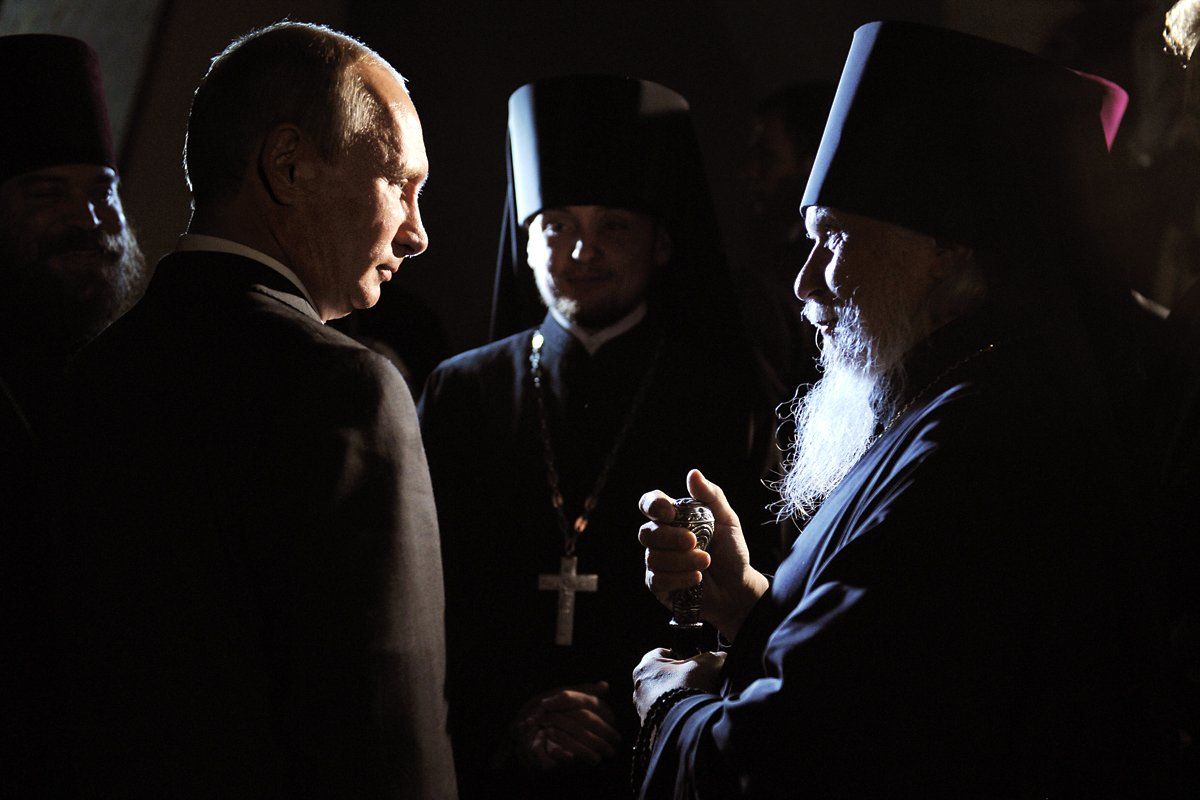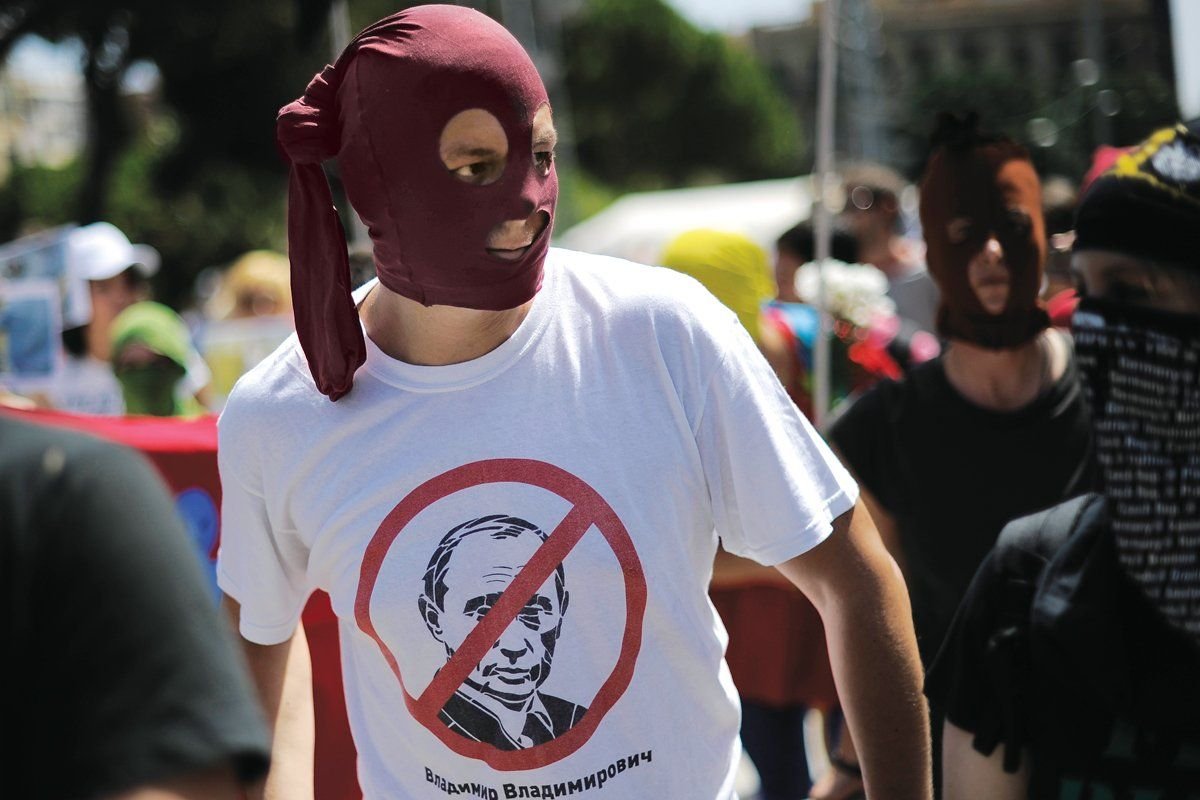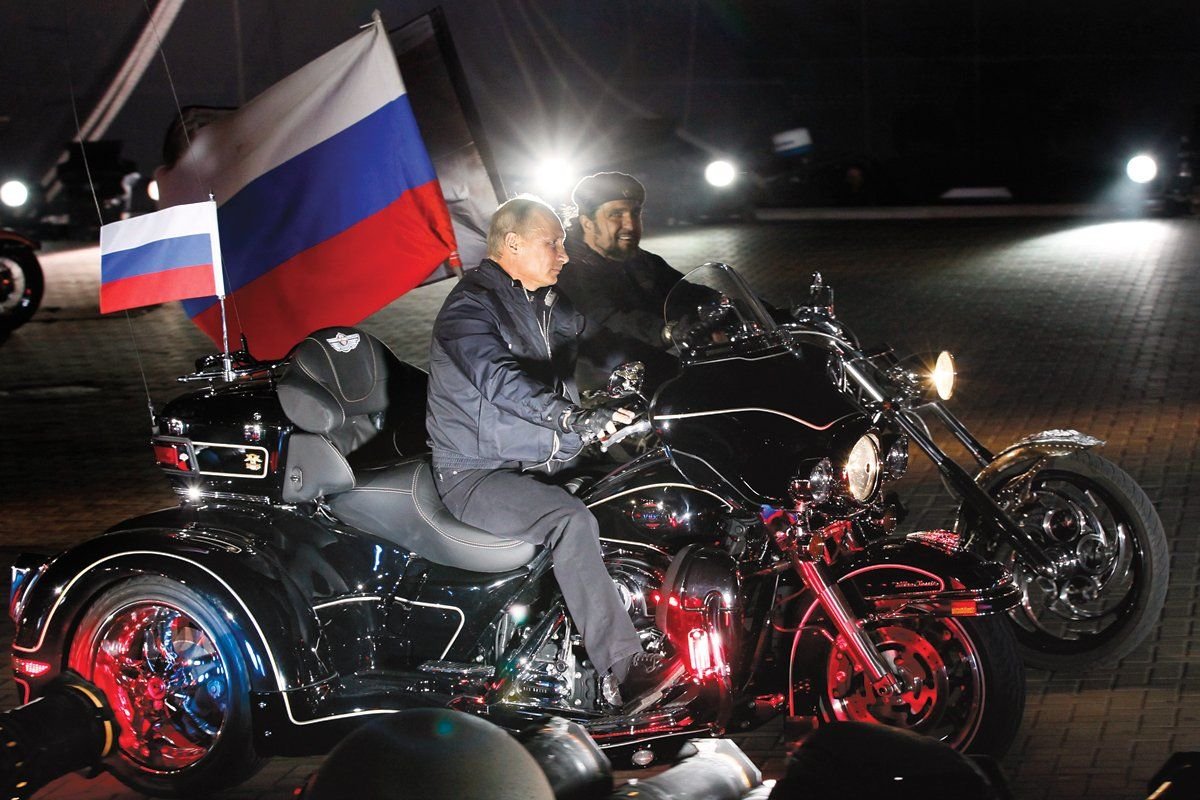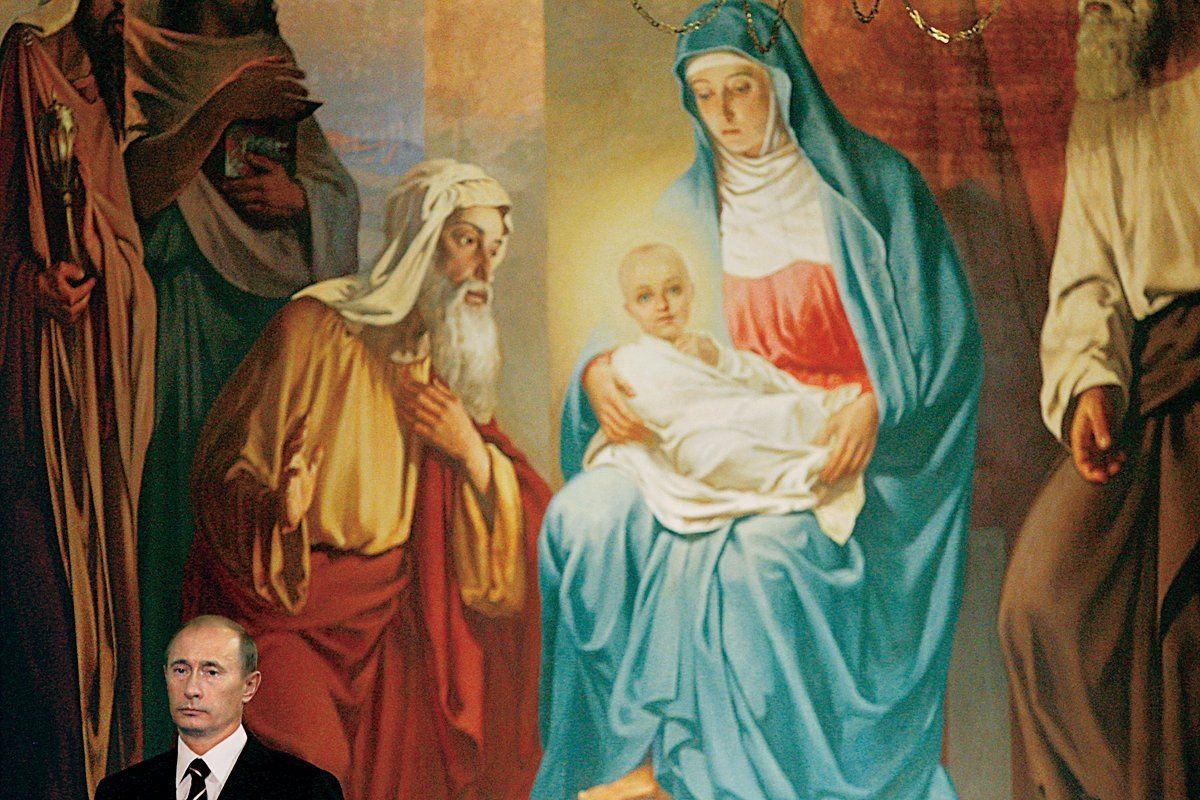
"The enemies of Holy Russia are everywhere," says Ivan Ostrakovsky, the leader of a group of Russian Orthodox vigilantes who have taken to patrolling the streets of nighttime Moscow, dressed in all-black clothing emblazoned with skulls and crosses. "We must protect holy places from liberals and their satanic ideology," he tells me. "The police can't cope with the attacks ... crosses have been chopped down, there's been graffiti on church walls."
There is something of Robert De Niro's Travis Bickle in Ostrakovsky's fervor. Like the disgruntled main character of Scorsese's epic film Taxi Driver, the vigilante sees himself in a fight against cultural degradation. "When I came back from serving in the Chechen War, I found my country full of dirt," he says. "Prostitution, drugs, Satanists. But now, religion is on the rise."
A few years ago, Ostrakovsky and his vigilantes seemed like marginal curiosities in Russia, burning copies of the Harry Potter books in protest of "witchcraft." But as Vladimir Putin's third presidential term comes into focus, the cross-wearing thugs are now right in line with the ideology emanating from the Kremlin—and from the Russian Orthodox hierarchy. After near extermination under Communist rule, the church and religion are back at the heart of the country's politics. And they have been critical in helping Putin recast the liberal opposition's fight against state corruption and alleged electoral fraud into a script of "foreign devils" versus "Holy Russia."
Since Putin's reelection, a parade of priests have been loudly denouncing forces aligned against the president. The head of the Russian Orthodox Church, Patriarch Kirill, took to TV to say that "liberalism will lead to legal collapse and then the Apocalypse." On another occasion, he called Putin's rule "a miracle." And Archpriest Dmitry Smirnov has warned in a media interview that "one needs to remember that the first revolutionary was Satan."
The recent Pussy Riot trial, in which three female activists were given two-year sentences for performing a "blasphemous" punk prayer in Moscow's central cathedral—which asked the "mother of God to rid Russia of Putin"—has been a godsend for the Kremlin as it seeks to whip up nationalist fervor. The sentence was condemned in the West, with everyone from human-rights groups to Paul McCartney and Madonna supporting the "Pussies." But inside the country, it has been used by the radical right to reinforce the idea of a Russia under attack. "The puppets are having their strings pulled," wrote the daily Komsomolskaya Pravda, speculating the Pussies were following U.S. orders and that the U.S. State Department's support of LGBT rights was a ruse to undermine Russia's spiritual foundations. Russia's foreign ministry went so far as to say that Western criticism of the Pussy Riot trial was evidence that Russia espouses "Christian values" forgotten in the "postmodern West."
"People are wrong when they think Christ said 'forgive everybody,'?" declared Mikhail Leontiev, Russia's premier political TV personality, speaking on the trial during his primetime show. "You have no right to forgive enemies of the Fatherland and enemies of God." When Alexander Bosykh, a religious-nationalist aide to the deputy P.M., was photographed punching a female Pussy Riot protester, he responded: "You only turn the other cheek to people you know. I don't know her so I hit her."
In the southern city of Rostov-on-Don, a recent incident captured the darkening mood. A gang of men with shaved heads kicked and punched a demonstrator who was protesting the Pussy Riot sentence. When detained by the police, the men trotted out the national-religious rhetoric: "He insulted our sacred, holy things," the men said. "We work out together at the gym ... and we share the same faith."
The Orthodox Church has long been central to Russian identity—ever since 988 A.D., when Vladimir the Great made perhaps the most decisive choice in the country's history and opted to convert pagan Kievan Rus to Byzantium's form of Christianity rather than Rome's. Over time, Russia developed deep suspicions of the Christian traditions and political networks of Western Europe. When Ivan the Terrible was crowned the first Tsar of All Russia in 1547, the church announced Moscow to be the "Third and Final Rome," the inheritor of St. Peter's Rome and Byzantium, and the last bastion of Orthodox Christianity standing up to a Europe mired in heresy.
The church's power continued uncontested until the overthrow of the tsars in the early 20th century, when it became a prime target for the new revolutionaries. When Vladimir Lenin came to power, he told his comrades, "the more representatives of the reactionary clergy we shoot, the better." After 1917, the Soviet Union saw the greatest persecution of Christians since the time of Diocletian: 200,000 clergy killed and 41,000 churches destroyed.
But for all its avowed atheism, the U.S.S.R. continued to utilize religious paradigms, from the icons of party leaders carried at Red Army parades, to stories of pioneer "martyrs" and the creed of Marx, Engels, and Lenin as the Socialist Holy Trinity. In the midst of World War II, Joseph Stalin—a former seminary student—revived the church to unite the country, addressing Russians with the religiously resonant terms "brothers and sisters." Until 1989 the church was allowed to survive under strict Secret Service supervision. Priests had to report to the KGB and were expected to relate anything of interest told in confession. While Christians were persecuted, the patriarchate always proclaimed its support of the U.S.S.R.: "Believers and nonbelievers in our country work together under a peaceful sky," wrote the deputy patriarch to a Western newspaper in 1974.

Since the Soviet Union's collapse, the church has been rebuilding its power. Today, 90 percent of ethnic Russians now identify themselves as Orthodox, according to statistics from the Levada Center, an independent research organization, and the sociology institute VCIOM. There are some caveats: fewer than 10 percent of Orthodox respondents say they attend church regularly, and 30 percent of them admit they don't believe in God. (The phrase "Orthodox atheist" has become common.) And despite the rise of Orthodox slogans on the radical right, Russia is certainly not in the middle of an Iran-style religious revolution. But religion remains a potent marker of Russian national identity—and a cornerstone of the old tsarist formula of "Autocracy, Orthodoxy, Nationhood," which is being reestablished by the Kremlin with a very 21st-century sensibility.
For its part, the state has gone from persecuting the church to co-opting its ancient tropes. A 2008 primetime documentary, The Lessons of Byzantium—hosted by Putin's personal confessor, Archimandrite Tikhon—told the story of how the culturally superior Byzantium flourished under a centralized government and an emperor unified with the church, but was supposedly brought low by a combination of "barbarians" from Western Europe intent on pillaging its wealth; corrupt oligarchs; and mendacious Venetians.
Though this version of Byzantium's demise is not supported by many academics, the documentary served to validate Putin's "power vertical" (as he calls it), his jailing of rival oligarchs, and his guarded foreign policy. In a similar spirit, the new culture minister, Vladimir Medinsky, made his name with a series of bestselling revisionist pop-history books debunking what he called "dirty [Western] myths" about Russia. Medinsky argued that Ivan the Terrible was actually a "humane ruler" (and that the U.S.S.R. never invaded, only "incorporated" the Baltics). "No country has faced so much prolonged demonization" as Russia, the culture minister has said.
The church's "Third Rome" legacy—reinforced by Soviet personality cults and a pervasive prison culture that celebrates strong leadership—underpins the concept of the ideal Russian leader as a divinely chosen autocrat. Thus Putin simply couldn't afford a second-round runoff in the presidential elections. From a democratic point of view, a runoff—even if staged—would have helped confer legitimacy by introducing an element of competition. But any sort of challenge would have been a blow against Putin's quasi-monarchical aura.

One of Putin's first photo ops after becoming president was with the Night Wolves, a gang of Orthodox bikers. The bikers used to be anti-Soviet, pro-American rebels. Now, they are patriotic and pro-Putin, and have changed the inscriptions on their leather and flags from English to Cyrillic. The Night Wolves' anthem is the folk-metal track "Slavic Skies." The music video of the song intercuts shots of rockers wearing tight jeans and crosses with Russian knights fighting invaders.
We are being assaulted by the seed of the Mongol horde/Attacked by the yoke of the infidels ... But the sky of the Slavs boils in our veins ...
Putin visited the Night Wolves this year at their annual festival in Sevastopol, Crimea. He arrived by limo; on a previous visit, he rode a bike and wore shades and a leather jacket. Sevastopol was the spot where Catherine the Great founded the Imperial Black Sea Fleet, and the port survived an epic siege in the Crimean War. A symbol of Russian grandeur, it became part of Ukraine after the country declared independence in 1989. Crimea still has a majority Russian-language population, and the Kremlin has been busy giving out Russian passports on the peninsula. The Russian Navy also retains a base in Sevastopol, for which Russia pays Ukraine $98 million annually, for the prestige as much as for military sense. Senior Russian Orthodox priests also attended the bike fest, exhorting "Shining Rus" not to "give up Sevastopol" (and chiding the bikers for hanging out with topless girls). For their part, the bikers staged a mass ride through Moscow after the Pussy Riot case, to show they were ready to defend the church.
On Aug. 18, Sergey Baranov became the first member of the clergy to resign in protest in the wake of the Pussy Riot trial. Since then, Baranov says that he has been the target of a PR campaign accusing him of being a drunk; that senior members of the local administration have visited his apartment in Tambov, which he shares with his invalid mother, to convince him to keep quiet (the incident was witnessed by a Russian journalist); and that friends and family have been encouraged to persuade him to tone down his outspoken criticism.

Baranov remembers asking a religious teacher once why Orthodox bishops "behave like KGB." He says the man told him "it was because they were all KGB themselves, and work with their methods: intimidation, intrigues, corruption."
The church has never openly explored its KGB past. When archives were opened at the start of the 1990s, both the previous and present patriarchs were revealed to have been KGB agents—but the files were quickly shut before details of their activities could be explored.
"The tragedy of the church is that it has always grown too close to the state, and then it pays for it. Now the church is trying to prove to the Kremlin it is a serious and useful player," says Archpriest Alexei Uminsky, a Moscow clergyman whose ministry includes members of the protest movement. He has announced that the church needs to "demand answers" from the government about corruption in schools and local administrations.
"We are at a crossroads: either the church starts to stand up for conscience or it will get blamed for all the Kremlin's faults. But for that we need to abandon our old illusions: the 'Third Rome,' dreams of an Orthodox superpower," Uminsky says.
In August, Uminsky was criticized by the head of the Synod's PR department, which said he was "confusing pacifism and Christianity." Voices such as his are largely drowned out by the patriarchate's pro-Kremlin faction. This might reflect genuine loyalty, but there are financial factors at play, too. In the '90s, the church was allowed to sell duty-free cigarettes, and imported 10 percent of all the tobacco flowing into Russia. After Putin's rise, the church has also received generous economic support from state-allied energy giants. Its wealth is now assumed to be in the billions. In 2004, the Duma passed a law to return to the church all its pre-revolutionary property, making it potentially the largest landowner in Russia. "The church simply couldn't exist without state support," says priest Dmitry Sverdlov. "Small corrections in tax law would collapse the church."
This year has seen an increasing focus on Patriarch Kirill's personal tastes. A photograph was discovered showing the patriarch wearing a Breguet wristwatch worth more than $30,000, and it was revealed that he owns a Moscow penthouse worth many millions. (Rumors have flown that Kirill's own personal worth is allegedly as high as $4 billion.) Meanwhile, a consumer-rights NGO has accused the patriarchate of using the Cathedral of Christ the Savior, where Pussy Riot performed their punk prayer, for commercial activities including corporate parties. A Russian court ruled the activity wasn't commercial but "mutual gift-making for a recommended price"; the consumer-rights group suggested putting the patriarch forward for a Nobel Prize in economics for inventing a new form of financial transaction. In response, in a TV interview, Kirill connected accusations of financial irregularities with acts of seemingly random vandalism on church property, and said: "We tell the whole world—the church cannot be destroyed!"
Strife between liberals and ultra-Orthodox nationals reached a fever pitch last month, after a mother and daughter were stabbed to death in Kazan. The words "Free Pussy Riot" had been daubed in blood on the walls of their apartment. Komsomolskaya Pravda hysterically accused Pussy Riot supporters of "murder[ing] women" and Archpriest Smirnov said "the blood of the victims are on the conscience of the supporters of Pussy Riot, here and abroad." It soon turned out, however, that the alleged killer was a religious man who—according to his own mother—disapproved of the punk activists and had apparently employed the blood-graffiti to confuse the police.
For all the sometimes frightening and often shrill rhetoric of Putin's Orthodox supporters, the new incarnation of Putin's rule resembles less a thought-out program than a carnival where spooks dress up in cassocks and thugs adorn themselves with crucifixes, shouting snatches of medieval theology, Soviet conspiracy theories, and folk-metal choruses.
Georgij Mitrofanov, a deeply independent cleric and the only archpriest to have written extensively about how Orthodoxy has not faced up to its past, gave perhaps the most incisive interpretation in an interview with a religious magazine in Russia:
"We lost so many honest people in the 20th century, people prepared to mean what they say, that we have created a society where imitation and role play are the norm," he said. "Before we had people shouting they were building Communism, but they were just using slogans that gave them opportunities. Now a new lot, and indeed some of the old one, shout about 'Holy Russia.' The words mean nothing."
Uncommon Knowledge
Newsweek is committed to challenging conventional wisdom and finding connections in the search for common ground.
Newsweek is committed to challenging conventional wisdom and finding connections in the search for common ground.
About the writer
To read how Newsweek uses AI as a newsroom tool, Click here.








